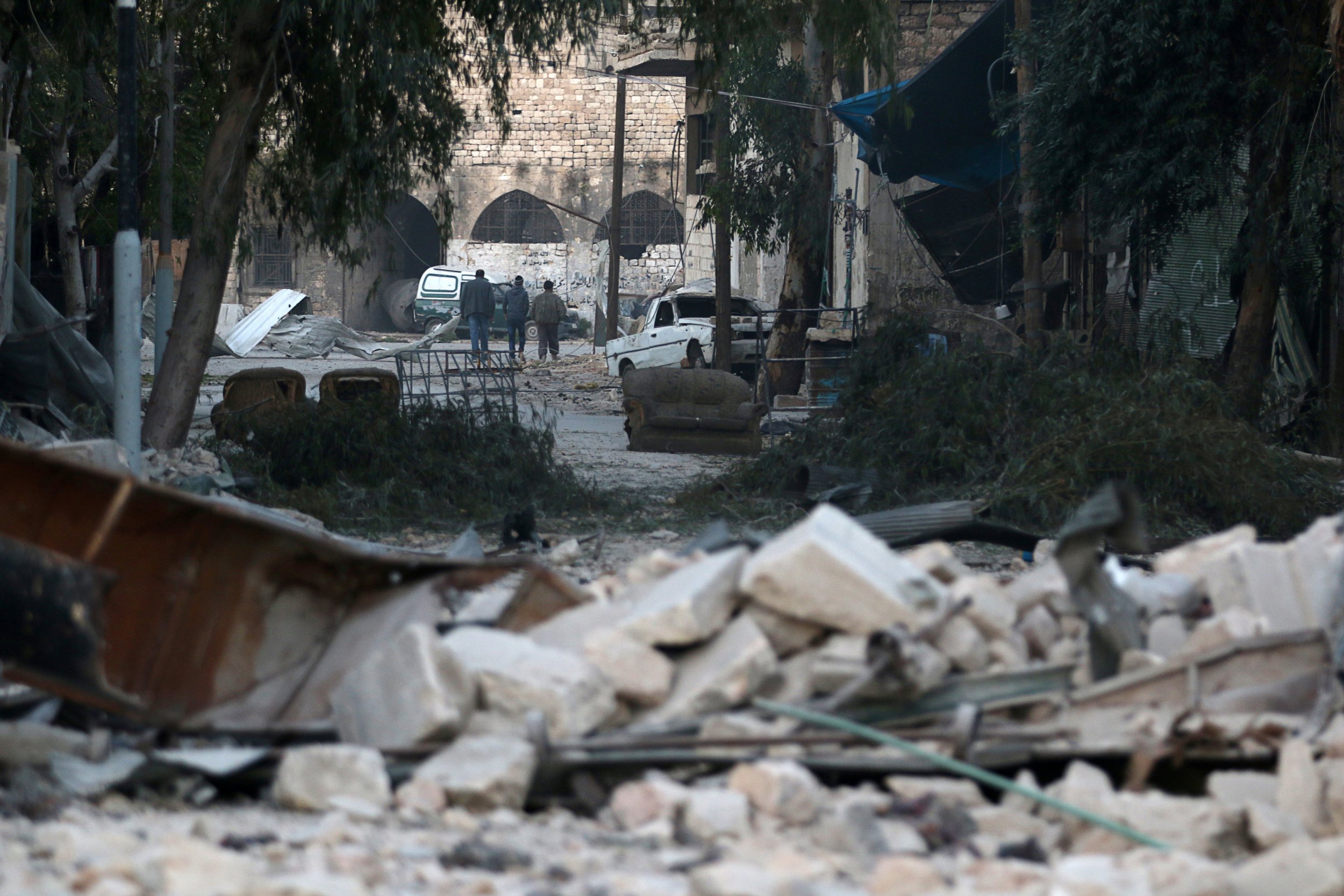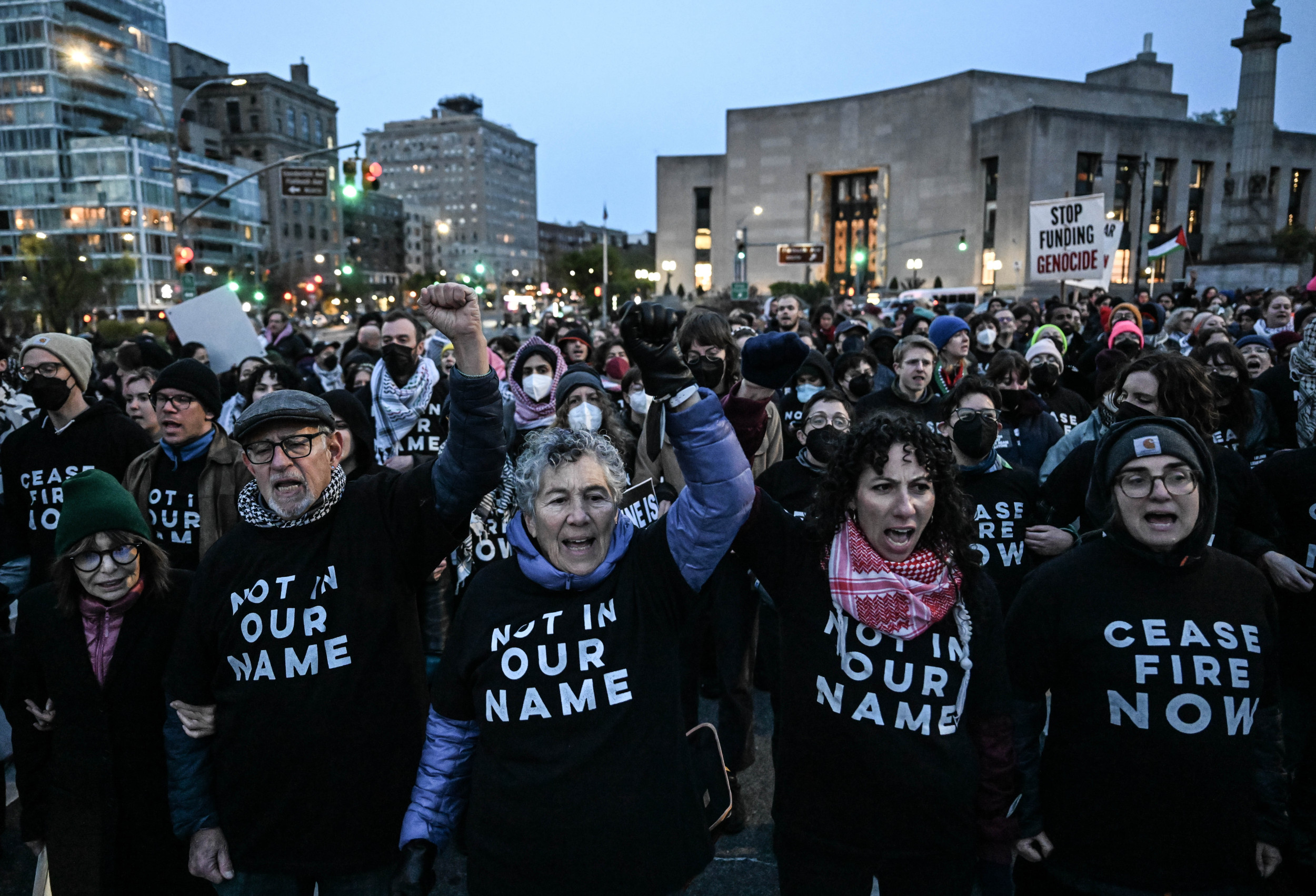
days after the last functioning hospitals were bombed out of operation in the eastern part of Aleppo, activists are warning that the city could become "the next Madaya."
More than a quarter of a million people living in eastern Aleppo now have no access to urgent medical care. The World Health Organization (WHO) said on Sunday that while some access to health services are available via smaller clinics, there is no longer any trauma care, major surgeries or consultations for serious health conditions. The organization adds that it's "impossible" to deliver aid to the eastern part of the city, which has been under siege since July.
Related: Syrian president Bashar al-Assad hopes Donald Trump will be an ally
"We are facing here a new Madaya," Mohamad Katoub, advocacy manager for the Syrian American Medical Society (SAMS) in Turkey, tells Newsweek. He is referring to the besieged town in western Syria where as many as 40,000 people were starving earlier this year, resulting in dozens of deaths. The situation in the town is so dire that many children are now resorting to suicide, according to Save The Children.
A hospital in Syria is targeted every 17 hours and a health worker is killed every 63 hours, according to SAMS. In the past 144 days, the organization said there have been 143 attacks on medical facilities and staff; around one-third of those incidents occured in besieged Aleppo.
"What about now? 250,000 people besieged in a city like Aleppo, where there are no resources?" Katoub adds. "We don't know what we will be facing in such a city like Aleppo."
Eastern Aleppo's sole children's hospital was among the last remaining facilities irreparably damaged by bombs dropped by the Syrian government last week, according to residents and medical workers who spoke with The New York Times. A devastating video taken by Al Jazeera journalists shows the aftermath of the attack, as nurses swaddle newborn babies and prepare to transfer them to safety.
"Besiegement has been used in Syria to push people to surrender or to flee for four years. It's a strategy the Syrian regime uses against the people who live in the non-government areas," says Katoub. "Besiegement here is not just preventing people from having their food or their medication, but from their basic needs like water and heating."
Now, when Syrians are injured in shelling, few medical care options are left, says Katoub. Essentially, they are left to die. "People are praying for God to be killed, not injured," he says.
Katoub is in New York with Hivin Kako, executive director of the Bihar Relief Organization, an NGO helping people in northern Syria, and Reem Alhaswani, co-founder of Basmeh & Zeitooneh, an NGO helping Syrian refugees in Lebanon and Turkey. Together, they're meeting with representatives of multiple governments, including the U.K., Japanese, European Union and Italian missions to the U.N., to push for further protection of civilians in Syria. At 9:30 E.T. on Friday, SAMS is calling for doctors and medical staff around the world to go on a 30-minute strike to "show your solidarity with Syria's doctors and medical personnel."
A public health outbreak in Aleppo is another concern, says Katoub. There have already been seen before in areas of Syria where malnutrition and hellish living conditions have been forced on residents. In 2014, polio re-emerged in Syria, a country declared free of the disease in 1999, after vaccination rates fell and infrastructure needed to provide clean water was destroyed. Currently, there are reports of a serious meningitis outbreak in Madaya, according to Save The Children.
Another purpose of the group's trip is to get "a lead on the coming Trump administration," says Kako. There is growing concern that President-elect Donald Trump's sympathetic, even favorable, views of Russia and President Vladimir Putin could make finding a solution to the Syrian crisis even more difficult. Russia's year-long involvement in the Syrian war has made matters worse, and Bashar al-Assad has called Trump a "natural ally."
President Barack Obama during his trip to Lima, Peru earlier this week said he is "not optimistic about a the short-term prospects in Syria."
"Maybe we have to talk to him through the language [Trump's] emphasizing," says Kako. "He's talking about counter-terrorism; counter-terrorism starts from dealing with the root of the cause. The root of this is the violence inside Syria that was started by the regime. Without dealing with the root cause for the conflict, we cannot just shift it to this counter-terrorism."
He adds: "Also, if you deal with that root, you also decrease the number of refugees across the world because that is another point of his concern." Trump has called for "extreme vetting" of Syrian refugees, and a potential cabinet member, Kris Kobach, was seen carrying plans to prohibit the entry of any Syrian refugees to the U.S.
"We should make sure that this new administration, or people surrounding Trump, know that civil society will be also fighting ISIS. Syrians are fighting against ISIS, they don't want it," says Alhaswani.
Newsweek spoke with the group on Monday, hours after the U.N. Security Council held its latest meeting on Syria. Stephen O'Brien, the under-secretary-general for humanitarian affairs and emergency relief coordinator, said in a speech that he is "more or less at my wit's end as a human being." He went on to describe the spate of attacks over the past week as "yet another low in an unrelenting human onslaught."
More than anything, Katoub, Kako and Alhaswani plan to push leaders on the immediate protection of civilians while encouraging the fostering of a political will to actually end the conflict. They know this means a long road ahead.
"There's a very clear escalation of violence in the country. If those violators didn't see a power facing them, didn't see who is willing, really, to stop those violations, they will never stop," says Katoub. "They will not come to a negotiation with anyone. Power needs to be faced by power. We have been hearing a lot of talk about a commitment to a political solution. What kind of political solution can be done when there are commitments to war crimes, more than protection of civilians?"
Read more at Newsweek.com:
Airstrike targets third Syrian hospital within 24 hours, says monitor
ISIS used chemical weapons dozens of times in Iraq and Syria, analysis shows
Putin's murderous Syria raids set him back in Ukraine
Uncommon Knowledge
Newsweek is committed to challenging conventional wisdom and finding connections in the search for common ground.
Newsweek is committed to challenging conventional wisdom and finding connections in the search for common ground.
About the writer
Before joining Newsweek, Lucy Westcott was an editorial fellow at The Wire. Previously a United Nations correspondent for the Inter ... Read more
To read how Newsweek uses AI as a newsroom tool, Click here.








